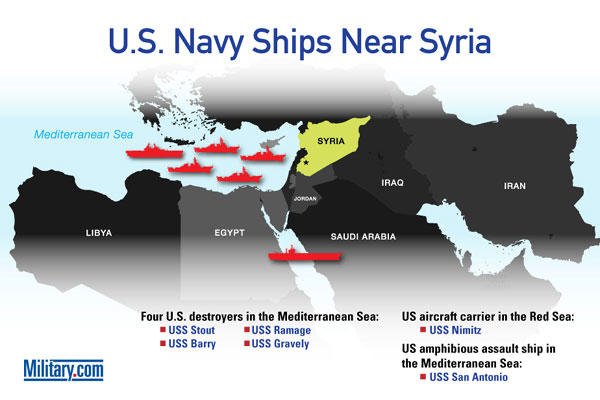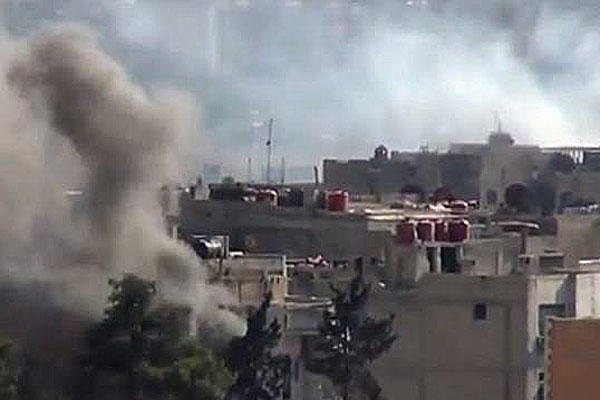The Pentagon has ruled out hitting Syrian chemical weapons stockpiles or sending U.S. troops to secure the sites where they are stored after any potential missiles strikes, officials said Thursday.
“We are taking into account in our planning that there could be environmental impacts in large dispersions of chemical stockpiles” in the form of clouds of toxic agents following any U.S. airstrikes, Pentagon Press Secretary George Little said Thursday.
Little added that “we are not contemplating boots on the ground in any way, shape or form” to secure chemical weapons that would remain in the control of forces loyal to Syrian President Bashar al-Assad.
Little spoke at a Pentagon briefing after concerns were raised in Congress that Obama might order U.S. troops into Syria following airstrikes to seize Assad’s weapons of mass destruction. Congress is debating a strike on Syria ahead of a potential full vote in the House and Senate next week.
Little stressed that any attack on Syria authorized by Congress would be limited and of short duration and would be intended to “degrade and deter” Assad’s ability to use chemical weapons. “This is not going to be a long, protracted drawn-out conflict” that would require ground troops, Little said.
Adm. Jonathan Greenert, the chief of naval operations, pointed to the firepower aboard at least four destroyers on station off the coast of Syria that could be ordered into action by Obama with the approval of Congress.
|

|
At an American Enterprise Institute conference, Greenert said the new Block IV Tomahawk Land Attack Missile (TLAM) aboard the destroyers “brings a really good asset to a commander.”
The new TLAMS can be re-programmed in flight and change targets.
“You fly it and it can receive changes,” Greenert said. “It can go up and it can loiter [over a target],” he said.
Russia has boosted its own naval presence in the Mediterranean to shadow the U.S. ships, but Greenert said the aging Russian fleet was of little immediate concern. Greenert said he considered the presence of the Russian ships to be a “neutral factor” in any U.S. decision to strike Syria.
In Moscow, Sergei Ivanov, the Kremlin chief of staff, said the Russian ships sent to the Mediterranean were intended for a possible evacuation of Russian citizens in the event of an American attack, Russia’s Ria Novosti news agency reported.
Several hundred Russians were believed to be in the vicinity of the small Syrian port of Tartus, where Russia maintains what it calls a “logistical” center.
In a separate statement, Russia’s Deputy Defense Minister Anatoly Antonov said earlier that that the Russian ships were meant to send a message to the Americans, Ria Novosti reported.
“Our warships are a guarantee of regional stability, an attempt to restrain other forces that are ready to launch military operations in the region,” Antonov said.
“Our actions are in strict compliance with international law and the United Nations Charter,” Antonov said, adding that the Mediterranean Sea is quite close to Russia’s borders.
At Thursday’s Pentagon briefing, Little again tried to clear up confusion left by Defense Secretary Chuck Hagel’s suggestion that Russia had supplied Syria with chemical weapons.
In testimony to the House Foreign Relations Committee on Wednesday, Hagel said “there’s no secret that the Assad regime has had chemical weapons, significant stockpiles.” When asked about the source of the chemical weapons, Hagel said, “The Russians supply them, others are supplying them with those chemical weapons. They make some themselves.”
The White House and the U.S. intelligence community have stressed that the Assad regime was solely responsible for the Aug. 21 attacks on the Damascus suburbs that allegedly killed more than 1,400, and Little quickly put out a statement saying that Hagel misspoke.
“[Hagel had been] referring to the well-known conventional arms relationship between Syria and Russia,” Little said.
“The Syrian regime has a decades-old, largely indigenous chemical weapons program,” Little said, adding that some of those conventional arms could be modified or otherwise used to support the chemical weapons program.
On Wednesday, Russian President Vladimir Putin said that Syria could soon be receiving a new conventional weapons system from Moscow that would give a major boost to Syria’s air defenses.
In interviews with Russia’s Channel 1 TV and the Associated Press, Putin confirmed that Moscow has a signed contract with Damascus to deliver S-300 air defense missile systems to Syria, and he suggested that Russia would go ahead with the delivery if the U.S. attacked.
“We have a contract to supply S-300 missiles, and we’ve already supplied some parts, but not all of it because we decided to suspend the supplies for a while,” Putin said.
“But if we see international law being violated, we will reconsider our future actions, including supplies of such sensitive weapons to certain regions of the world,” Putin said.





























